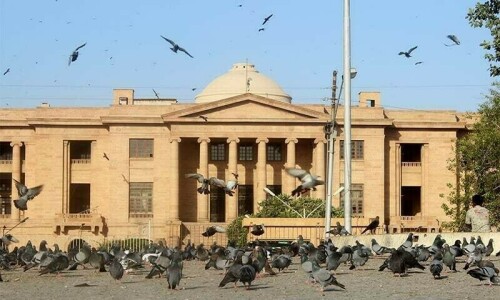KARACHI: Prime Minister Shahid Khaqan Abbasi has defended release of Jamaatud Dawa chief Hafiz Saeed from house arrest and said those desirous of bringing the latter to justice for any crimes he may have committed should “prosecute him internationally”.
In an interview with Bloomberg news agency released on Thursday, he reiterated Pakistan’s stance that Washington’s efforts to win the war in Afghanistan by increasing the number of US troops there and supporting the Afghan forces would end in failure.
Mr Abbasi also rejected the allegation that Pakistan provided sanctuary to militant groups and asserted instead that attacks in the region were originating from across the border in Afghanistan.
“The court, a three-judge bench, has released him [Mr Saeed] saying there are no charges against him; the country has a law you know,” said the prime minister.
“Prosecute him internationally if there is substance to these charges — these are accusations only. No evidence has been provided by India.”
India, however, says it has provided evidence to Pakistan, according to the Bloomberg report.
India and the US accuse Saeed of masterminding the 2008 Mumbai attacks and claim he is leader of the militant group Lashkar-e-Taiba. Saeed denies the charges.
Speaking about the situation in Afghanistan, Mr Abbasi urged the Afghan government and the Taliban to launch peace talks. “We have assured them of whatever assistance we will be able to offer, but things are quite fragmented on that side,” he said.
“Pakistan has tried twice, but the talks have been sabotaged.”
The premier made it clear the country would take action against terrorists and extremists within its borders, including the Taliban-affiliated Haqqani network.
Islamabad and Washington are at loggerheads over President Donald Trump’s demands in August that Pakistan take tougher action against terrorists operating within its borders, part of a US attempt to bring resolution to the 16-year war in Afghanistan, said the report.
Pakistan protested that the US didn’t recognise the thousands of Pakistani servicemen and civilians who had died in the war on terror. The army also began fencing its porous and disputed border with Afghanistan in an effort to contain attacks, a move that prompted a furious response from Kabul.
“We have asked them to share any intelligence about the Haqqani network; we will take action,” Mr Abbasi said. “The attacks however are being made from across the border; we have pinpointed even the sanctuaries of the attackers. Cross-border infiltration from Afghanistan is the order of the day.”
When asked if Pakistan would move against Taliban leaders who have allegedly lived for years in Quetta, the prime minister said “we will act against them if they really exist.”
Published in Dawn, December 1st, 2017












































Dear visitor, the comments section is undergoing an overhaul and will return soon.